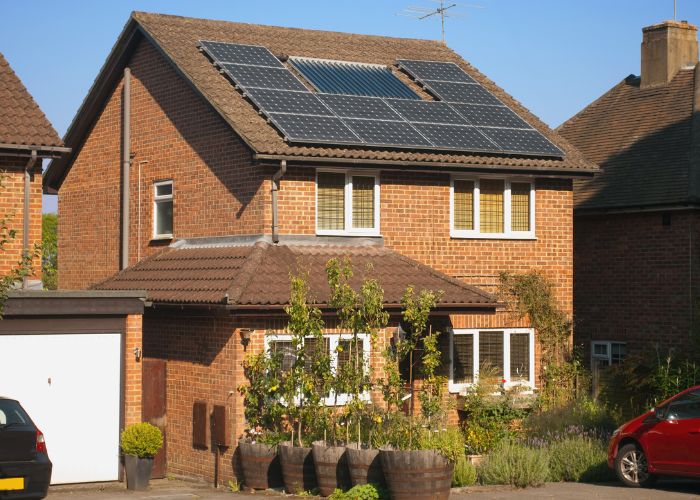TIPS FOR MAKING YOUR RENTAL PROPERTY MORE ENERGY EFFICIENT
There are many features of a rental property that will make it appeal to different audiences, from its location to its features. Ensuring your property is suited to your target market can improve rental yields, increase tenancy periods and improve tenant satisfaction.
But with the huge rise in energy costs in the past couple of years, making a rental home more energy efficient has never been more beneficial to both landlords looking to attract tenants and to those renting and looking to keep their energy costs down.
What Are EPC Ratings?
Currently any house that is sold or let out, needs to have an EPC rating of E or above. That means landlords must have an official EPC certificate done every 10 years.
This EPC (Energy Performance Certificate) helps both landlords and tenants to understand the energy efficiency of the property. Whilst giving landlords an understanding of any investment that may be required, if gives tenants an idea of how well insulated the house or flat is and whether their energy bills might be higher or lower than another property.
The government had discussed bringing in an EPC rating of ‘C’ for rental properties. Whilst this date was originally 2025 for new rental properties, it has now been scrapped and we wait to hear if or when it may be reintroduced, but the government’s website does still say they are hoping to have as many as possible privately rented homes in England and Wales ‘to be upgraded to EPC Band C by 2030, where practical…’
So whilst there isn’t the legislative necessity to improve your rental properties efficiencies, any investment now, will mean landlords are a step ahead when new grading is eventually put in place.
The Biggest Energy Savers
Whilst it will depend on the type of properties a landlord owns, the biggest energy savers are usually:
- Insulation – cavity or loft insulation
- Heating systems – such as a modern energy efficient boiler
- Draught-proofing gaps and cracks
- Double glazing windows and modern energy efficient doors
- Renewable energy systems – Solar panels and heat pumps
Insulating Your Property
Around 25% of heat from a home leaves through the roof, whilst 30% is lost through the walls. Roof and cavity insulation can make a significant difference to the amount of heat kept within the home. Insulation may reduce the tenant’s energy bills as well as making the property warmer and easier to rent out.
Don’t forget curtains! It might sound basic, but having curtains, especially ones that are (thermo) lined or made of thicker fabric can really help stop heat escaping through windows and doors and keep rooms warmer.
Install Double Glazed Windows
Having double glazing installed in place of single glazed windows could save you £135 per year and offer several benefits including:
- Retain more heat – keeping you warmer and save energy to heat your home.
- Reduce noise – keep out more outside noise. Ideal if the property is in a busy urban area.
- Reduce condensation – this builds up less with good quality double glazing.
- Reduce interior damage – Rays from the sun can discolour and damage carpets, furniture and carpets, double glazing reduces these damaging UV rays.
…And Doors
And don’t forget the front or back door! Modern doors like double glazed windows, have significantly better insulation properties than older UVPC ones, helping to keep the heat in as well as fitting better and preventing any draughts.
Solar Panels
Installing solar panels on the roof of your property has become increasingly more affordable and are a great way to increase your property’s EPC rating. Using a renewable energy like the sun, the source of energy is free and whilst helping to cut your tenant’s energy bills, solar panels will also reduce the carbon footprint of the home.
Any surplus energy generated can be sold back to the grid creating a small income. A win win! A typical home with solar panels in the UK is estimated to save 1 tonne of carbon per year.
Heat Pumps
Another way to heat your property that has a greener footprint is to install a heat pump. They capture heat from the air, ground or water and pass it through an exchanger to produce heat.
Heat Pumps use electricity to work but are highly efficient. In fact it’s said that heat pumps are more than twice as efficient as fossil fuel heating in cold temperatures.
However, not all properties will suit heat pumps, or other work may be required to a property before installing one.
New Boilers
Improving the EPC for a property can also be done by installing a new boiler.A modern boiler is going to be more efficient that an older one, and this in part is due to the fact that boilers are now ‘condensing’ boilers – which means they recover more heat from the exhaust flue and funnels it back into the system to heat water.
The government has funding options and grants for all three of the above home improvement options, see the Funding section below for more details.
Smaller Energy Efficiency Savings
In addition to the larger investments listed above, there are a whole host of smaller things that landlords and tenants can do to create energy savings.
Switch To Energy Efficient Appliances
If your appliances are reaching the end of their lives and need an upgrade, make sure you choose electrical goods that are energy efficient. Due to EU regulations, appliances must be marked with an energy label indicating how efficient they are.
The energy label rates appliances from A to G. A is the highest rating and G is the lowest in terms of energy efficiency. Appliances with a higher energy rating will provide the biggest savings longer term. Some appliances such as ovens use an older scale which is A+++ to G.
Electrical devices to think about renewing are: Dishwashers, Washing machines, Tumble dryers, Ovens, TVs, Freezers and Fridges
Replace Old Lightbulbs With Energy Efficient Ones
Did you know that lighting accounts for around 11% of a property’s electricity use? Switching to LED bulbs is one of the easiest changes you can make to improve the energy efficiency of the property.
Bleed Radiators
Bleeding your radiators is also another way to make sure the energy is being used efficiently in your heating system. If you have air in the system it can affect how your radiators heat your rooms.
If your radiators are cooler at the top than they are at the bottom, it’s likely you have air in your radiator. Watch or share this video which shows tenants how you bleed a radiator.
Install A Smart Meter
By the end of 2024 every business and home in Great Britain will have been offered a smart meter. The devices are free and are connected to your energy supply free of charge. They automatically track the amount of gas and electricity you’ve used, enabling landlords and tenants to keep better track of their energy usage and potentially use less.
If your property doesn’t have a smart meter, contact your energy supplier.
Funding
There are several different schemes being run by the government to encourage property owners to invest and make their homes and rental properties more energy efficient. These include:
- The Great British Insulation Scheme covers many different types of insulation investment for properties whose energy performance certificate is D to G. The current scheme is scheduled to run until March 2026.
- The boiler upgrade system gives grants of up to £7,500 towards air and ground source heat pumps and £5,000 towards biomass boilers.
- There are various grants and schemes available for installing solar panels. This article by the independent gives landlords an overview of some options.
EXPERT HELP AND ADVICE FROM ABODE
At Abode, we help our landlords get the most value from their rental properties, be that through finding the right tenants, keeping tenancy voids to a minimum or recommending local contractors to carry out work and improve the energy efficiency of your home.
For more information, give the team at Abode a call today 0117 973 8866 or fill out a contact form and we’ll get back to you.







